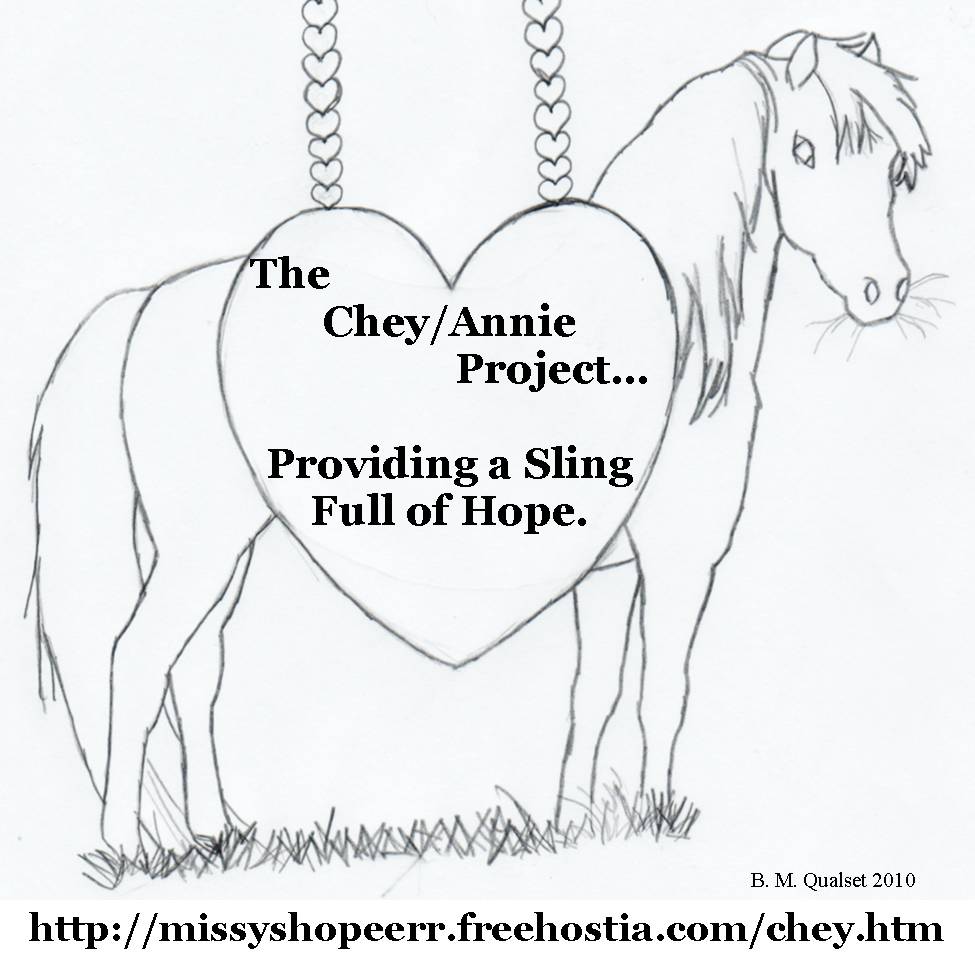

Missy's Hope Equine Rescue Resource
General Information:
Mission and Policy Information
Our Programs:
The Chey/Annie Project Fundraisers
The Chey/Annie Project Accounting
The Chey/Annie Project Future Sling Locations
Rescue Information:
Resources:
Pet Food and Product Warnings and Recalls
Congressional Information:
Letter Writing Campaigns For Horses
There Is A Viable Alternative To Equine Slaughter
Horse Health Information:
Cushings/Insulin Resistance Information
Helping Your Horse Prepare For Being Blind
Articles Relating To Equine Blindness
Miscellaneous:
|
What Breed Registries Can Do To Stop Irresponsible Breeding. |
|
Today there are many horses being born into this world that are unlucky enough to face slaughter as the end of their life here on this earth. These horses are not “unwanted” as many people would claim, but instead are horses whose owners were not responsible for them for the entirety of their life. They did not plan ahead when the time came to retire the horse or in situations where they could no longer keep, or no longer wanted the horse. I believe that not only the horse owners are responsible for these horses, but also in some ways the breed registries themselves. Many breed registries encourage over breeding to make money to support their registries. What can breed registries do to help this situation? Here are some of my ideas. I believe that breed registries should consider implementing rules that will limit the number of horses bred at each farm each year. By limiting the number of breedings at a farm each year, you limit the number of horses born overall. Many of today’s farms breed more than one hundred horses at a time, these horses contribute to the nearly 100,000 horses slaughtered every year. If you limited each breeder to 10 foals a year at a normal registration fee, and then drastically increased the registration fee for each additional foal, many breeders would limit their breedings and work to chose the best mare and stallion combinations that they can create for their horses. This would ultimately increase the value of the horses overall, by decreasing the number of horses, and improve the breed. Breed registries should also consider a reduction in fees if an owner/breeder sterilizes their horse. This will encourage more owners to geld stallions. Many will say that this is unfair to mare owners because it is more costly for mares to be sterilized than stallions. Breed registries could also offer a similar reduction in fees for each year that the mare is not bred. This would be comparable to the fees for owners of geldings. This may encourage more individuals to sterilize horses early in life that do not fit the breed standards. A reduction in fees does not have to be drastic. It could be as simple as ten dollars a year per horse. Require genetic testing for horses that are possible carriers of genetic disorders. Refuse to allow a horse to be registered if it has a genetic disorder or is a carrier of a genetic disorder unless it has been sterilized. This can only improve the breed. By making sure that each horse is free of genetic disorders, you decrease the chances of genetic disorders being found in future generations. Create a retirement fund for the horses of your breed. Encourage owners to donate a portion of their winnings to a fund for the care of horses when they have retired from the show ring or racetrack. These horses give their all because their owners ask them to, they deserve a chance to retire with dignity. Create a euthanasia fund. This is something that horse owners do not like to think about, those final days for their horses. One of the complaints that owners have, and one of the reasons that slaughter exists according to people who promote slaughter, is that the cost of euthanizing an older horse is too expensive. If one dollar of every registration fee were put into a fund for euthanasia, then owners who cannot afford to euthanize their horse could submit a form to their breed registry for help. The dispersal of the fund could be based on the owner’s current financial situation. Yes, this will require some extra paperwork, but more horses would have humane ending to their life. Each of these ideas should be evaluated and changed to fit your breed registry. It will take time to implement them and to work out any bugs that they may have. In the long run, these ideas will help the registry by creating a better market for their horses and by helping keep the breed pure and of the best quality. Most importantly it will better the lives of millions of horses and owners in the future.
|
|
Written by Brandi M. Qualset, 2007 |
| |